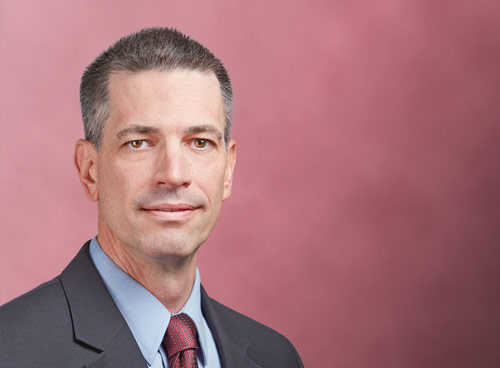PwC
Jeremy Fago is US Power and Utilities and Deals Leader at PwC.

There is much focus now on the economy nationwide and how it affects all the energy and utilities industry is involved in. It puts pressure on what can be achieved in the fast-changing energy landscape.
Inflation has reared its ugly head this year and dominates much conversation on how to achieve reliable and secure energy supplies. There is much more involved in that of course, so PUF turned to the expert relied on in these pages for years.
PUF readers look forward to the sage reflections of Jeremy Fago, PwC's leader on U.S. Energy, Utilities and Mining Deals. PUF talks with him on a regular basis to understand the latest financial happenings and M&A activity in the energy and utilities industry.
PUF's Steve Mitnick: A lot has been going on in the first half of 2022 with interest rates, natural gas prices, supply chain, oil prices, federal policy, war, and pandemic. How's that been affecting M&A in energy and utilities?
Jeremy Fago: A lot has changed since we spoke last, and some of it you could argue would be expected, but not all of it. The interesting thing about this industry is it's very resilient and fundamentally we still see robust opportunity and activity on the deals front.
When you look at ESG, it's not going away. I think as companies look at what their goals are, what their platforms are as they exist today, and where they want to go, you're going to see focus organically, but you're also going to see ESG manifest itself into inorganic activity, to the extent that there are gaps to fill, or businesses that maybe don't fit certain profiles. We've seen some of that since we spoke last, with relatively robust renewable activity, for example.
There's a lot of focus on the shift to decarbonize. Some of the things we've spoken about in the past; evaluation of existing portfolios, how those look, what they need from an investment perspective, and what they provide as a platform in evolving toward decarbonization goals.
PUF: Because there's so much ESG pressure, a company maybe can't fulfill some of its obligations within its own footprint or own region. That seems to be a possible driver of M&A activity to deal with that challenge.
Jeremy Fago: I think that's spot on. Then when you layer on top of it, the supply chain challenges that are alive and real. That's certainly going to drive perspectives on what can be achieved efficiently and effectively within versus what to do inorganically.
PUF: It's not just renewables in the center of the country but there's a lot of activity on offshore wind. There're so many folks chasing it, including foreign players. I wonder if it bids up the prices for the sellers.
Jeremy Fago: I think your observation is valid. We've certainly seen appreciation in value there evidenced by certain leases that have come to auction. The supply/demand dynamics that you point out are key to that.
Clearly, decarbonization has really impacted the demand side as folks look for opportunities to put capital to work in those efforts, and offshore is an attractive space for some on the decarbonization side given the large scale of these projects.
You touched on another point with your observation, and you touched on it with your opening question as well. Costs continue to rise across the board and inflationary impacts and supply chain challenges are putting real strains on affordability. I think we all want to move quickly in our desires to decarbonize but we need to do it in a way that's affordable and reliable and those aspects tend to compete against each other, at least, right now.
PUF: In your PwC group, it's energy, utilities, and mining. Mining seems to be getting more attention lately. Do you see any of that?
Jeremy Fago: It's funny that you mentioned it because with mining, we weren't talking much about it, in relative terms, for a few years now.
Now there's a significant focus when it comes to battery supply and the precious metals aspect therein, and the fact that a lot of that doesn't come from the U.S. Given the things highlighted earlier, some of the massive changes we've gone through since the last time we spoke on the geopolitical and global front, there's a brighter lens on it.
The conversation has ramped up and I think ultimately it goes beyond just having access to the raw materials but also owning some of that IP so that we can lead as a nation on it. I've had more mining conversations in the last six months than I probably had in the last ten years as that focus has sharpened.
PUF: Another area is a discussion going on in nuclear. Do you see M&A activity coming around that?
Jeremy Fago: I think it's certainly a possibility. When you look at the industry footprint, there are several companies that have nuclear assets within their broader portfolio. The bang for the buck on large-scale nuclear on the zero-carbon emission front is clear, but there have been challenges that everyone is aware of too.
I do think there's a larger conversation around advanced Small Modular Reactors and it's something we're keeping a close eye on.
From a deals perspective, as we've said in the past with other emerging trends and different technologies, there will probably be activity where you have companies looking outside to gain platforms for that. Versus trying to do it in house, particularly when the workforce and IP sit outside of the current portfolio.
Anytime you see change, like what we are experiencing with shifting portfolios, I think deals are on the table, because in some cases, buying is easier than trying to do something organically to the extent that expertise and that scale maybe sits outside of your immediate holdings.
PUF: What do you think about larger mega-deals, mergers of equals? We haven't seen much. What about over the next year or two given all that is happening?
Jeremy Fago: I don't think it's going to be like it was last decade. We've obviously already seen a significant amount of consolidation in this industry. A lot of large utility scale or large merger of equals, mega-deals that played out.
A lot of the rationale for that was to ultimately shift focus organically. We saw major platforms, particularly on the midstream and LDC side get acquired. Bringing those in to basically be able to optimize and grow those platforms longer term. I believe that's why we've seen a dearth of mega-deals in the past handful of years, because companies have been focused on executing that strategy.
We have a not so dissimilar situation here, where we're targeting carbon reduction and that could incent deals. However, the other side of that is, it seems the bar continues to get raised in how deals will be evaluated and the scrutiny they'll be under given ESG goals. I think that companies are going to be evaluated on how doing a deal of significance and of size, particularly a corporate-type acquisition or merger, fits within those decarbonization goals.
I think you're going to see a lot of portfolio-type activity because of that, where maybe I'm looking at something and saying, I think we can achieve our net-zero goals more quickly if we divest this platform, or we acquire this platform to plug into our portfolio to support where we want to go.
But if you think about some of these large companies — there's a mix of assets therein — it may be a little more challenging to get those to the finish line.
I'm not saying we won't see some, but in general, not without very clear articulation of how a deal fits into what you've put out there from a carbon-reduction perspective.
I also think there are likely going to be deals after those deals to basically rationalize those portfolios that don't fit perfectly into those plans initially. We've seen some of that historically and I believe we'll see more given the carbon reduction layer here.
PUF: Over the last decade we've seen power and gas prices go up and down. To some extent, we've seen divestiture of non-regulated businesses as a result when commodity prices were low. Now prices are up. Does that make your head spin?
Jeremy Fago: I wouldn't say the fluctuations in the commodity make my head spin necessarily, but maybe that's a function of how long I've been around this industry, so I'm dating myself a bit. Fundamentally, we're talking about investment in assets that are here for decades at a time.
It's important that we have that long-term perspective.
I say that with a grain of salt because what can make your head spin, and as you know, society in general, is very near-term focused. Managing that can be challenging to say the least and company specific situations will obviously be impacted differently. But, again, we're talking about critical infrastructure and service with long-term assets, so focusing on the long game while balancing the near term is critical.
PUF: What are you going to be looking for, during the rest of 2022, and into 2023? You're always looking around the corner.
Jeremy Fago: I hope a lot of the volatility that we've seen over the last months has tapered well in advance of the longer-term. I do hope that we start to see a bit more certainty behind the broader macroeconomic aspects that have been impacting this industry and the markets broadly.
Again, as I stated at the beginning, ESG isn't going away. Carbon-reduction focus isn't going away. I do think that bar will continually get raised. And our clients are passionately focused on executing against the goals and plans they've laid out.
A major focus is how to look at the portfolio of investment, organic and inorganic, holistically.
Not just the financial returns but the customer and societal impact of that broadly, because the financial is ultimately linked to those impacts.
In some cases, that's going to mean going out and trying to do a deal. In some cases, it's going to be opportunistic. In some cases, I think it's going to mean the divestment of certain businesses. But you're going to continue to see ESG as a factor in deal rationalization be mentioned. I think it's table stakes.
Category (Actual):
Department:
